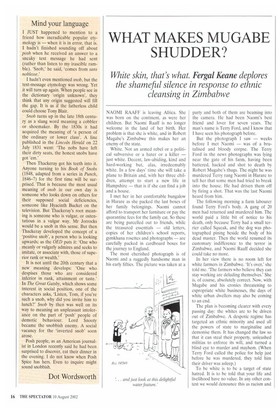Mind your language
I JUST happened to mention to a friend how ineradicable popular etymology is — when it is in error, that is. I hadn't finished sounding off about posh when he received an answer to a sneaky text message he had sent (rather than listen to my irascible ramble). 'Snob,' he said, 'comes from sans noblesse.'
I hadn't even mentioned snob, but the text-message etymology was wrong. Yet it will turn up again. When people see in the dictionary 'origin unknown', they think that any origin suggested will fill the gap. It is as if the fatherless child could choose Tony Blair.
Snob turns up in the late 18th century as a slang word meaning a cobbler or shoemaker. By the 1830s it had acquired the meaning of 'a person of the ordinary or lower class'. A line published in the Lincoln Herald on 22 July 1831 went: 'The nobs have left their dirty seats, the honest snobs have got 'em.'
Then Thackeray got his teeth into it. Anyone turning to his Book of Snobs (1848, adapted from a series in Punch, 1846-7) for the first time will be surprised. That is because the most usual meaning of snob in our own day is someone who looks down on others for their supposed social deficiencies, someone like Hyacinth Bucket on the television. But Thackeray's root meaning is someone who is vulgar, or ostentatious in a vulgar way. Mr Jorrocks would be a snob in this sense. But then Thackeray developed the concept of a 'positive snob', a person who is looking upwards; as the OED puts it: 'One who meanly or vulgarly admires and seeks to imitate, or associate with, those of superior rank or wealth.'
It is not until the 20th century that a new meaning develops: 'One who despises those who are considered inferior in rank, attainment or taste.' In The Great Gatsby, which shows some interest in social position, one of the characters asks, 'Listen, Tom, if you're such a snob, why did you invite him to lunch?' Snob by then was well on its way to meaning an unpleasant intolerance on the part of 'posh' people of demotic behaviour. Lord Snooty became the snobbish enemy. A social vacancy for the 'inverted snob' soon arose.
Posh people, as an American journalist in London recently said he had been surprised to discover, eat their dinner in the evening. I do not know when Posh Spice has hers. Even to inquire might sound snobbish.
Dot Wordsworth


























































 Previous page
Previous page